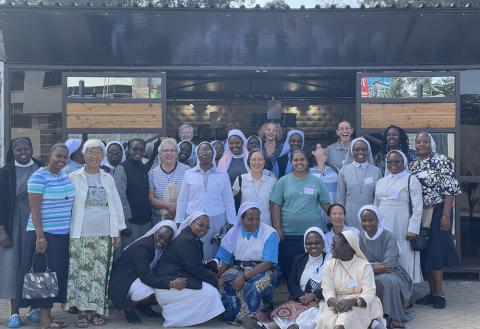
Sisters meet at the Mary Ward Center for the workshop "Accompanying victims of sexual and spiritual harm," organized by Voices of Faith International, in Nairobi, Kenya. (Courtesy of Mumbi Kigutha)
The Mary Ward Centre in Nairobi, Kenya, was home for four days to over 27 sisters representing 15 congregations of women religious living and working in different parts of Africa. The workshop, "Accompanying victims of sexual and spiritual harm," was organized by Voices of Faith International, or VoF, and held from Jan. 29-Feb. 2. Most of the participants are presently serving in leadership, formation, child protection, women's ministries, or as resource persons in their various congregations.
The issue of sexual and spiritual harm among religious women has been on the front burner in recent years, but this event is perhaps the first time African women religious gathered to engage in a down-to-earth discussion on the worrisome subject. The sisters know that they were not alone in the struggle. In the words of Scripture, "Your [brothers and sisters] throughout the world undergo the same sufferings (1 Peter 5:9)" — which means African sisters can gain insight into handling the problems of sexual and spiritual harm from the experience of the global sisterhood.
While the issue of sexual and psychological abuse of minors remains the predominant concern of the church, other forms of abuse, particularly in religious communities, attracted less attention until recent times.
A cursory search of the internet on the question showed me there is a significant amount of work on the subject matter. But women's religious communities are not complacent in the face of these anomalies, which undoubtedly affect both the lives of the individual sister and the entire congregation. These incongruities can be devastating; they weaken the expression of the charism, emptying the institute of her salvific mission to the world.
The workshop addressed these anomalies within women's religious communities, focusing on the different areas of unfettering oneself and the community from abuse and harm in order to promote the flourishing of all. Human thriving takes place in an environment devoid of any action that harms a person, be it sexual or spiritual; such action impacts human dignity. Restoring dignity demands delicate attention to the injured party, and critical inquiry into the situation that caused the hurt. The participants were exposed to the processes of accomplishing this role through self-examination.
In the process of self-examination, many of the members recognized themselves as victims and survivors as well. That is to say, they saw themselves in some sense as wounded healers. The realization of oneself as a wounded healer challenges us to take up the task of helping to revitalize the broken lives of persons traumatized by the experience of sexual and spiritual harm.
Advertisement
Trauma does not reside in an individual alone; the whole community suffers with the one so traumatized. Here the principle of ubuntu (in the Bantu language: "I am because you are and because you are, I am") amplifies the communal dimension of trauma. Consequently, a sister's traumatic experience is the experience of the entire congregation, an experience that if ignored may result in diminishing effectiveness in ministry and questioning of the congregation's relevance in society.
Often, the community seeks an external solution to its dwindling relevance, without knowing that the problem is from within. This is where self-examination or evaluation provides useful insight. Attention to internal issues — particularly as they pertain to the spiritual life — provides some clues. Such probing can reveal spiritual harm, which somehow is intertwined with spiritual practices as well as the vows of religion.
In the workshop, the exercise revealed to participants several causes of spiritual harm. Although trauma associated with sexual abuse is better known, that resulting from spiritual harm often passes for the practice of religion, sadly enough. Spiritual harm, particularly in the context of religious life, precedes sexual abuse — because spiritual harm is often a result of a power and control issue.
Faithful to its focus on preparing religious women for a mature and informed response to the phenomenon of sexual and spiritual harm, the exercise alerted participants to signs — particularly the seemingly innocuous ones — that portend abuse and harm: These are called red flags in religious life.
Participants became acquitted with a range of red flags associated with some key areas of religious life: 1. Joining a convent. 2. Training and formation. 3. Spiritual life, spiritual guidance, and confession. 4. Poverty. 5. Obedience. 6. Chastity. 7. Sexual abuse. 8. Leaving a congregation. Another red flag exists in communities devoid of a safe space, a sacred space, where each member can truly feel at home and fully express herself without being judged. Creating a safe space within the religious community is the first step toward addressing and eradicating any form of abuse.
The workshop explained several instances of sexual and spiritual harm and trauma associated with these incongruities — both in the lives of individual sisters and their communities — and also suggested ways to forestall their occurrences. But it is significant to note that the underlying causes of these anomalies lie not in individuals but in systems. Individuals who perpetrate abuse are products of a superstructure (a patriarchal construction) that has supported a particular way of behavior that is sustained by power.
Evidently sexual and spiritual harm is rooted in the abuse of power. In that case, abuse of power is not gender-specific. Although it can be sometimes difficult to understand the nature of abuse even when it is prevalent, both women and men vested with authority and power can potentially use their positions to the detriment of those they govern or those less powerful.

Workshop participants are pictured. (Courtesy of Mumbi Kigutha)
Because patriarchy is the dominant culture in Africa and elsewhere, the governance of women's religious communities inadvertently follows a patriarchal structure. African women religious must find creative ways to engage structures that tend to enervate women's creative energy, mostly in terms of governance. They must also employ indigenous knowledge in handling the problem of abuse and dealing with the resulting trauma, so as to create a community where sisterhood is the norm. The challenge to achieving any meaningful goal is standing in solidarity together to confront the problem, listening to each other and faithfully following the promptings of the Holy Spirit gifted to us at baptism.
There is no doubt that the Holy Spirit's direction of the ongoing synod of synodality brought together Voices of Faith and this small but concerned group of African women religious, to study and learn ways to accompany victims of sexual and spiritual harm at this time. The encounter has significantly unfettered participants, rekindled their energy for service, and empowered them to transmit the same learning to their various congregations and their apostolates, exuding generative energy into the life and ministry of their members, congregations, the local church, and society.






